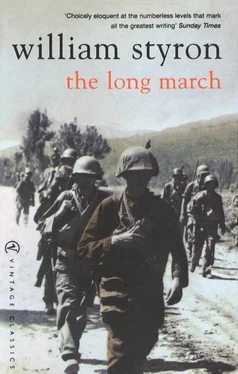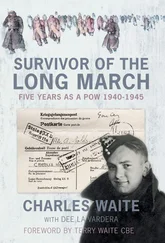William Styron - The Long March
Здесь есть возможность читать онлайн «William Styron - The Long March» весь текст электронной книги совершенно бесплатно (целиком полную версию без сокращений). В некоторых случаях можно слушать аудио, скачать через торрент в формате fb2 и присутствует краткое содержание. Город: New York, Год выпуска: 1952, ISBN: 1952, Издательство: Vintage Classics, Жанр: prose_military, на английском языке. Описание произведения, (предисловие) а так же отзывы посетителей доступны на портале библиотеки ЛибКат.
- Название:The Long March
- Автор:
- Издательство:Vintage Classics
- Жанр:
- Год:1952
- Город:New York
- ISBN:978-0099422792
- Рейтинг книги:3 / 5. Голосов: 1
-
Избранное:Добавить в избранное
- Отзывы:
-
Ваша оценка:
- 60
- 1
- 2
- 3
- 4
- 5
The Long March: краткое содержание, описание и аннотация
Предлагаем к чтению аннотацию, описание, краткое содержание или предисловие (зависит от того, что написал сам автор книги «The Long March»). Если вы не нашли необходимую информацию о книге — напишите в комментариях, мы постараемся отыскать её.
The Long March — читать онлайн бесплатно полную книгу (весь текст) целиком
Ниже представлен текст книги, разбитый по страницам. Система сохранения места последней прочитанной страницы, позволяет с удобством читать онлайн бесплатно книгу «The Long March», без необходимости каждый раз заново искать на чём Вы остановились. Поставьте закладку, и сможете в любой момент перейти на страницу, на которой закончили чтение.
Интервал:
Закладка:
In the noonday light Sergeant O’Leary, his face brightly pink, was still talking. Culver snapped awake with a start. O’Leary grinned down at him—“Damn, Lieutenant, you’re gonna crap out tonight if you’re that tired now”—and Culver struggled for speech; time seemed to have unspooled past him in a great spiral, and for an instant—his mind still grappling with the memory of a hurried, chaotic nightmare—he was unable to tell where he was. He had the feeling that it should be the night before, and that he was still in the tent. “Did I go to sleep, O’Leary?” he said, blinking upward.
“Yes, sir,” O’Leary said, and chuckled, “you sure did.”
“How long?”
“Oh, just a second.”
“Christ, I am tired. I dreamt it was last night,” Culver said. He got to his feet. A truck moved through the clearing in a cloud of dust. There seemed to be new activity in the command post, and new confusion. Culver and O’Leary turned together then toward the operations tent; the Colonel had come out and was striding toward them, followed by Mannix.
“Culver, get your jeep and driver,” he said, walking toward the road, not looking up. His voice was briskly matter-of-fact; he strode past them with short, choppy steps and the swagger stick in his hand made a quick tattoo, s/ap-s/ap-slapping against his dungaree pants. “I want you and Captain Mannix to go with me down to Third Batt. See if we can help.” His voice faded; Mannix trailed behind him, saying nothing, but his face seemed to Culver even more exhausted, and even more grimly taut, than it had been an hour before.
The road was a dusty cart-path that rambled footlessly across scrubby, fallow farmland. Shacks and cabins, long ago abandoned, lay along its way. They piled into the jeep, Mannix and Culver in the back, the Colonel in front next to the driver. They hadn’t far to go—less than a mile—but the trip felt endless to Culver because the day, by now a fitful carrousel of sleepy sounds, motions without meaning, seemed wildly, almost dangerously abstracted, as if viewed through drug-glazed eyes or eyes, like those of a mole, unacquainted with light. Dust billowed past them as they went. Above them a blue cloudless sky in which the sun, pitched now at its summit, beat fearfully down, augured no rain for the day, or for the evening. Mannix said nothing; his silence prompted Culver to turn and look at him. He was gazing straight ahead with eyes that seemed to bore through the Colonel’s neck. Tormented beast in the cul-de-sac, baffled fury, grief at the edge of defeat—his eyes made Culver suddenly aware of what they were about to see, and he turned dizzily away and watched the wreck of a Negro cabin float past through the swirling dust: shell-shattered doors and sagging walls, blasted fagade—a target across which for one split second in the fantastic noon there seemed to crawl the ghosts of the bereaved and the departed, mourning wraiths come back to reclaim from the ruins some hot scent of honeysuckle, smell of cooking, murmurous noise of bees. Culver closed his eyes and drowsed, slack-jawed, limp, his stomach faintly heaving.
One boy’s eyes lay gently closed, and his long dark lashes were washed in tears, as though he had cried himself to sleep. As they bent over him they saw that he was very young, and a breeze came up from the edges of the swamp, bearing with it a scorched odor of smoke and powder, and touched the edges of his hair. A lock fell across his brow with a sort of gawky, tousled grace, as if preserving even in that blank and mindless repose some gesture proper to his years, a callow charm. Around his curly head grasshoppers darted among the weeds. Below, beneath the slumbering eyes, his face had been blasted out of sight. Culver looked up and met Man-nix’s gaze. The Captain was sobbing helplessly. He cast an agonized look toward the Colonel, standing across the field, then down again at the boy, then at Culver. “Won’t they ever let us alone, the sons of bitches,” he murmured, weeping. “Won’t they ever let us alone?”
III
That evening at twilight, just before the beginning of the march, Mannix found a nail in his shoe. “Look at it,” he said to Culver, “what lousy luck.” They were sitting on an embankment bordering the road. The blue dusk was already scattered with stars, but evening had brought no relief to the heat of the day. It clung to them still, damp and stifling, enveloping them like an overcoat. The battalion, over a thousand men, was ready for the march. It stretched out in two files on either side of the road below them for more than a mile. Culver turned and looked down into Mannix’s shoe: sure enough, a nail-end had penetrated the lining at the base of the heel, a sharp pinpoint of torture. Mannix inspected the bottom of his big dirty foot. He pulled off a flake of skin which the nail had already worn away. “Of all the lousy luck,” he said, “gimme a band-aid.”
“It’ll wear right through, Al,” Culver said, “you’d better get another pair of shoes. Try flattening it out with the end of your bayonet.”
Mannix hammered for a moment at the nail and then looked up in exasperation. “It won’t go all the way. Gimme that band-aid.” A rusty spatter of blood he had picked up at noon was still on the sleeve of his dungarees. He had become nervous and touchy. All that afternoon, after they had come back, he had seemed, like Culver, still shaken by the slaughter, still awed, and rather despondent. Finally, he had alternated moments of remote abstraction with quick outbursts of temper. The shock of the explosion seemed to have set something off in him. His mood had become vague and unpredictable, and he was able to shift from sour, uncommunicative gloom to violent anger in an instant. Culver had never seen him quite so cranky before, nor had he ever seen him so testily at odds with his men, to whom he usually had shown the breeziest good will. All afternoon he’d been after them, nagging, bellowing orders—only to fall suddenly into a profound and brooding silence. As he squatted in the weeds eating his evening meal two hours before, he had hardly said a word, except to murmur—irrelevantly, Culver thought—that his company “had better goddam well shape up.” It puzzled Culver; the explosion seemed to have stripped off layers of skin from the Captain, leaving only raw nerves exposed.
Now he had become fretful again, touchily alert, and his voice was heavy with impatience. He mumbled as he plastered the band-aid on his foot. “I wish they’d get this show on the road. That’s the trouble with the Marine Corps, you always stand frigging around for half the night while they think up some grandiose doctrine. I wish to Christ I’d joined the Army. Man, if I’d have known what I was getting in for when I went down to that recruiting office in 1941, I’d have run off at the door.” He looked up from his foot and down toward the command group nearly at the head of the column. Three or four officers were clustered together on the road. The Colonel was among them, neat, almost jaunty, in new dungarees and boots. On his head there was a freshly clean utility cap with a spruce uptilted bill and a shiny little silver leaf. At his side he wore 8 pearl-handled .38 revolver, glistening with silver inlay. It was, as usual, loaded, though no one knew why, for he was never known to shoot it; the general feeling seemed to be that it was his emblematic prerogative, no more an affectation, certainly, than a visored hat encrusted with gilt, or grenades worn at the shoulder. The pistol—like the swagger stick; the nickname; the quizzical, almost tenderly contemplative air of authority—was part of the act, and to be sure, Culver reflected, the act was less offensive, less imperious than it might be. One simply learned soon to believe that the pistol “belonged,” just as the name “Old Rocky” belonged; if such an act finally did no harm, if it only flattered his vanity, was the Colonel to be blamed, Culver asked himself, if he did nothing to mitigate the total impression?
Читать дальшеИнтервал:
Закладка:
Похожие книги на «The Long March»
Представляем Вашему вниманию похожие книги на «The Long March» списком для выбора. Мы отобрали схожую по названию и смыслу литературу в надежде предоставить читателям больше вариантов отыскать новые, интересные, ещё непрочитанные произведения.
Обсуждение, отзывы о книге «The Long March» и просто собственные мнения читателей. Оставьте ваши комментарии, напишите, что Вы думаете о произведении, его смысле или главных героях. Укажите что конкретно понравилось, а что нет, и почему Вы так считаете.






![Джеффри Арчер - The Short, the Long and the Tall [С иллюстрациями]](/books/388600/dzheffri-archer-the-short-the-long-and-the-tall-s-thumb.webp)





